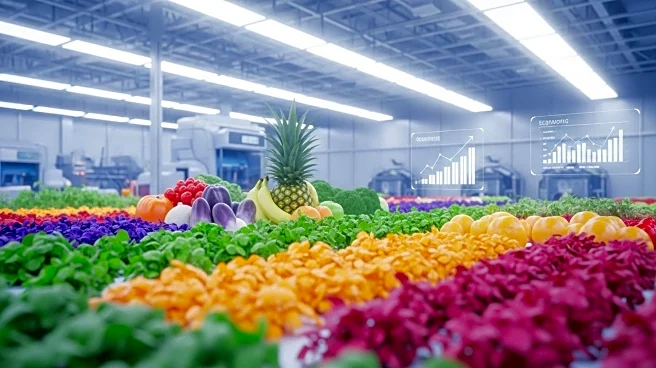What is the story about?
What's Happening?
The global genetic engineering in agriculture market is expected to grow significantly, with projections indicating an increase from USD 1.24 billion in 2025 to USD 2.59 billion by 2034. This growth is driven by a rising emphasis on sustainable farming practices and the need to meet increasing global food demands. North America currently leads the market, holding a 38% share in 2024, while Asia Pacific is anticipated to experience substantial growth. Key technologies contributing to this market include transgenic techniques and gene editing tools like CRISPR-Cas9, which enhance crop traits such as herbicide tolerance and abiotic stress resistance. The U.S. market alone is projected to grow from USD 303.24 million in 2024 to USD 702.99 million by 2034, supported by strong regulatory frameworks and technological advancements.
Why It's Important?
The expansion of the genetic engineering market in agriculture is crucial for addressing global food security challenges. As the population grows, the demand for higher crop yields and resilient agricultural practices becomes more pressing. Genetic engineering offers solutions by improving crop resistance to pests, diseases, and environmental stresses, thereby enhancing productivity and sustainability. This market growth also reflects a broader trend towards integrating biotechnology in agriculture, which could lead to reduced reliance on chemical inputs and more efficient resource use. Stakeholders, including farmers, biotech firms, and regulatory bodies, stand to benefit from these advancements, which promise to transform agricultural practices and contribute to global food security.
What's Next?
The market is expected to see continued innovation and investment in genetic engineering technologies. Regulatory bodies in the U.S. and other regions will likely play a pivotal role in facilitating the adoption of these technologies by ensuring safety and compliance. As the market evolves, collaborations between biotech firms and agricultural companies are anticipated to drive further advancements. Additionally, the focus on sustainable farming practices will likely increase, with genetic engineering playing a key role in developing crops that can withstand climate change impacts.
Beyond the Headlines
The ethical and regulatory dimensions of genetic engineering in agriculture are significant. As these technologies advance, there will be ongoing debates about the safety and environmental impact of genetically modified organisms (GMOs). Public perception and acceptance of GMOs will also influence market dynamics. Furthermore, the potential for genetic engineering to contribute to biodiversity loss and the monopolization of seed markets by large corporations are concerns that need to be addressed through transparent and inclusive policy-making.

















